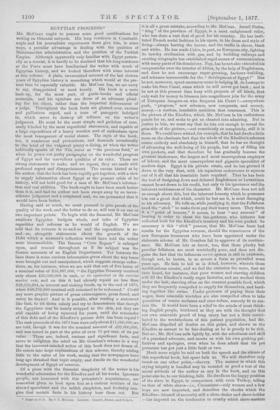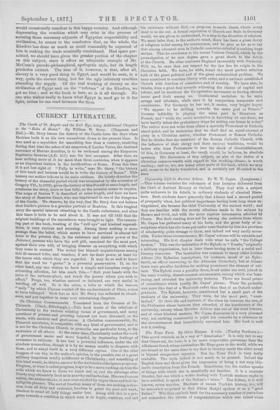EGYPTIAN PROGRESS.* Mn. McCoAN ought to possess some good qualifications
for writing on Oriental subjects. His long residence in Constanti- nople and his journalistic experiences there give him, in some ways, a peculiar advantage in dealing with the qualities of Mahommedan administration and the position of the Turkish Empire. Although apparently only familiar with Egypt person- ally as a tourist, it is hardly to be doubted that his long residence at the Porte must have familiarised the writer with much of Egyptian history, and we looked therefore with some interest at this volume. A plain, unvarnished account of the last sixteen years of Egyptian history is something which would at the pre- sent time be especially valuable. Mr. McCoan has, we are sorry to say, disappointed us most keenly. His book is a mere hash-up, for the most part, of guide-books and official materials, and his opinions are those of an advocate plead- ing for his client, rather than the impartial deliverances of a judge. Throughout the book facts are glossed over, excuses and palliatives urged, and a tone of panegyric indulged in, which serve to destroy all reliance on the writer's judgment. He must be the most simple and guileless of men, easily blinded by the most superficial statements, and capable of a large expenditure of a heavy wooden sort of enthusiasm upon the most transparent of social shams. The style of the book, too, is cumbrous and pretentious, and descends occasionally to the level of the vulgarest penny-a-lining, as when the writer habitually speaks of the Nile water as "the precious fluid," or when he pours out gushy paragraphs on the wonderful progress of Egypt and the marvellous qualities of its ruler. These are strong statements to make, and we repeat, they are made with profound regret and disappointment. The excuse hinted at by the author, that the book has been rapidly got together, with a view to supply information about Egypt at the present crisis of its history, will not hold good for a man of Mr. McCoan's informa- tion and real abilities. The book ought to have been much better than it is, and had its author not been swept away by an incon- siderate judgment and a misplaced zeal, we are persuaded that it would have been better.
Having said so much, we must proceed to give proofs of the quality of the work, and the better to do so, will test it on one or two important points. To begin with the financial, Mr. McCoan swallows Egyptian budgets whole, and talks of Egyptian capacities and reforms as he would of English. We are told that its revenue is so-and-so and the expenditure is so- and - so, alongside statements about the growth of the Debt which a moment's reflection would have told the writer were irreconcilable. The famous "Cave Report" is enlarged upon, and treated throughout as if its subject was the finance accounts of an English Department. Yet between the lines there is some curious information given about the way loans were brought out and manipulated, which suggests strange reflec- tions, as, for instance, when we are told that out of five loans, of a nominal value of 255,887,000, " the Egyptian Treasury received only about 235,000,000 in cash, or its equiva?ent at the current market rate, and on this it had already repaid no less than .£29,570,994, in interest and sinking funds, up to the end of 1875, when 246,734,500 nominal still remained to be redeemed," Could any more graphic picture of gross extravagance, gross fraud, and usury be drawn? And is it possible, after reading a statement like that, to sit down calmly and try to demonstrate that though the Egyptians may be nearly stripped to the skin, yet they are still capable of being squeezed for years, until the remainder of this debt and of the Khedive's private debt has been repaid ? The cash proceeds of the 1873 loan were onlyabout £11,000,000, we are told, though it was for the nominal amount of n2,000mo, and was issued in part at the price of over 70 per cent, of its par value. These are, indeed, curious and significant facts, and serve to enlighten the mind on Mr. Goschen's scheme in a way that the innocent-minded writer of this book does not dream of. Ile enters into large explanations of this scheme, thereby adding little to the value of his work, seeing that the newspapers have long ago thrashed that topic empty, and dwells on the wonderful development of Egypt ad nauseam,
Of a piece with the financial simplicity of the writer is his wonderful admiration for the Khedive and all his works. Ignorant people, not honoured with this potentate's acquaintance, are somewhat given to look upon him as a curious mixture of the shrewd speculator and the selfish simpleton, and foolishly ima- gine that certain facts in his history bear them out. But
* Egypt as 11 is. By J. C. Mccoan. London : Candi, Potter, and Galp In. it is all a gross mistake, according to Mr. McCoan. Ismail Pasha, " king " of the province of Egypt, is a most enlightened ruler, who has done a vast deal of good for his country. He has insti- tuted French social fashions in his opera, in his dress and style of living—always barring the harem, and the traffic in slaves, black and white. He has made Cairo, in part, an European city, lighting its tawdry civilisation with gas, and by building railways and erecting telegraphs has established rapid means of communication with many parts of his dominions. Nay, has he not also extended his conquests far over the interior of Africa, by the help of Englishmen, and does he not encourage sugar-growing, harbour-building, and schemes innumerable for the "development of Egypt ?" Has he not, moreover, spent enormous sums in helping M. de Lesseps to make his Suez Canal, sums which he will never get back ; and is he not at this present time busy with projects of all kinds, that only wait for money to blossom into magnificent jobs for the army of European hangers-on who frequent his Court ?—everywhere push, " progress," new schemes, new conquests, and money, money,—a restless, insatiable ambition that consumes. This is the picture of the Khedive, which Mr. McCoan in his enthusiasm paints for us, and seeks to get us cheated into admiring. But in justice to him, we must say that he lets out enough to reveal the grim side of the picture,—not consciously or completely, still it is there. We could have wished, for example, that he lead dwelt a little more on the obstinate fact that the whole of the Khedive's schemes centre entirely and absolutely in himself, that he has no thought of advancing the well-being of his people, but only of filling his own pockets, and that therefore he has gradually become the greatest landowner, the largest and most unscrupulous employer of labour, and the most unscrupulous and gigantic speculator of modern days. Egypt is his private estate, and he has ground it down to the very dust, with his rapacious endeavours to squeeze out of it all that his insatiable lusts required. That he has been the tool of designing Jews and debased Englishmen or Levantine% cannot beset down to his credit, but only to his ignorance and the inherent recklessness of his character. Mr. McCoan does not tell us enough about this, but the inherent honesty which he possesses lets out a great deal which, could he but see it, is most damaging to his advocacy. He tells us, while justifying it, that the Fellaheen need the " stick " to make them pay their heavy taxes, They deem it a "point of honour," it seems, to bear "any amount" of beating in order to cheat the tax-gatherer, who hitherto has collected both for the Khedive's treasury and his own pocket. So necessary is this " stick " process, that Mr. McCaw' fears bad results for the Egyptian revenue, should the consciences of the new European treasurers who have been appointed under the elaborate scheme of Mr. Goschen fail to approve of its continu- ance. Mr. McCoan lets us know, too, that these plucky but peculiar fellaheen are most wretchedly poor, and does not dis- guise the fact that the infamous corvje system is still in existence, though not, he insists, in so severe a form as prevailed some years ago. He fails to tell us in detail, however, wherein these modifications consist, and we feel the omission the more, that we have heard, for instance, that poor women and starving children Mill fill the Khedive's costly sugar factories, and are worked there under the laah, starving often on the coarsest possible food, which they are frequently compelled to supply for themselves, and herd- ing together like swine. Under pretence of paying them their wages, these miserable wretches are also compelled often to take quantities of coarse molasses and cane-refuse, scarcely fit to sus- tain life. It would have been a relief to the minds of most think- ing English people, burdened as they are with the thought that our own miserable greed of long usury has not a little contri- buted to the wretchedness of this patient population, had Mr. McCoan dispelled all doubts on this point, and shown us the Khedive as earnest to be fair-dealing as he is greedy to be rich. But no ; Mr. McCoan sails lightly by, with the adroitness and skill of a practised advocate, and mocks us with his own gushing pal- liatives and apologies, even when he does admit that his pet potentate has got just a little fault or two.
Much more might be said on both the speech and the silence of this superficial book, but space fails us. We will therefore this touch on one other point,—slavery. The manner in w crying iniquity is handled may be counted as good a test of the moral attitude of the author as any in the book, and on this point also he, to our thinking, fails. He dwells on the happy position of the slave in Egypt, in comparison with even Turkey, telling us that of white slaves—i.e., Circassians—only women and a few boys are now imported, and describes the checks which the Khedive—himself of necessity still a slave-dealer and slave-holder —has imposed on the tendencies to cruelty which slave-masters would occasionally manifest in this happy country. And although deprecating the cruelties which may exist in the process of securing these necessary adjuncts of Egyptian respectability and Civilisation, he comes to the conclusion that, on the whole, the Khedive has done as much as could reasonably be expected of him in making the trade nominally contraband. Had space per- mitted, we should have given the greater portion of the chapter on this subject, since it offers an admirable example of Mr. McCoan's pseudo-philosophical, apologetic style, but its length precludes extract. The sum of it, however, is that, after all, slavery is a very good thing in Egypt, and would be even, in a way, quite the correct thing, but for the ugly initiatory cruelties attending the supply. Of the real working of slavery on the civilisation of Egypt and on the "reforms" of the Khedive, we get no hint ; and as the book is here, so is it all through. No one who wishes really to know what Egypt is, need go to it for light, unless he can read between the lines.































 Previous page
Previous page